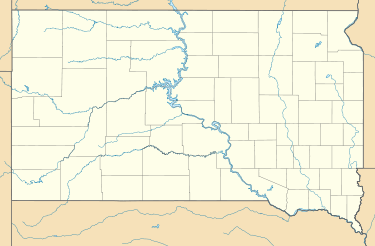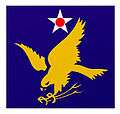Mitchell Municipal Airport
| Mitchell Municipal Airport Mitchell Army Airfield | |||||||||||||||
|---|---|---|---|---|---|---|---|---|---|---|---|---|---|---|---|
|
USGS 2006 orthophoto | |||||||||||||||
| IATA: MHE – ICAO: KMHE – FAA LID: MHE | |||||||||||||||
| Summary | |||||||||||||||
| Airport type | Public | ||||||||||||||
| Owner | City of Mitchell | ||||||||||||||
| Serves | Mitchell, South Dakota | ||||||||||||||
| Elevation AMSL | 1,304 ft / 397 m | ||||||||||||||
| Coordinates | 43°46′29″N 098°02′19″W / 43.77472°N 98.03861°WCoordinates: 43°46′29″N 098°02′19″W / 43.77472°N 98.03861°W | ||||||||||||||
| Map | |||||||||||||||
 MHE Location of airport in South Dakota | |||||||||||||||
| Runways | |||||||||||||||
| |||||||||||||||
| Statistics (2011) | |||||||||||||||
| |||||||||||||||
Mitchell Municipal Airport (IATA: MHE, ICAO: KMHE, FAA LID: MHE) is a city owned, public use airport located three nautical miles (6 km) north of the central business district of Mitchell, a city in Davison County, South Dakota, United States.[1] It is included in the National Plan of Integrated Airport Systems for 2011–2015, which categorized it as a general aviation airport.[2]
History
Opened in November 1937, during World War II, the facility was rebuilt in 1943 by the United States Army Air Forces as a Second Air Force B-17 Flying Fortress and B-24 Liberator heavy bomber training airfield field known as Mitchell Army Airfield.
From July to late September, 1943, the 700th Bomb Squadron of the 445th Bomb Group conducted their advanced training at Mitchell Army Air Field. Upon completion of training and subsequent notification for overseas deployment, the 700th Bomb Squadron flew to Lincoln Army Air Field for last minute aircraft modifications before taking the Southern Atlantic crossing route to Tibenham, England.[3]
On October 1, 1944, when training ended at the facility, it was transferred to Air Technical Service Command where it was assigned to Ogden Air Service Command as an axillary airfield.
Returned over to civil use after the war, it is now a public airport providing general aviation service.
Facilities and aircraft
Mitchell Municipal Airport covers an area of 1,376 acres (557 ha) at an elevation of 1,304 feet (397 m) above mean sea level. It has two asphalt paved runways: 12/30 is 6,700 by 100 feet (2,042 x 30 m) and 17/35 is 5,513 by 100 feet (1,680 x 30 m).[1]
For the 12-month period ending August 10, 2011, the airport had 19,450 aircraft operations, an average of 53 per day: 95% general aviation, 4% air taxi, and 1% military. At that time there were 29 aircraft based at this airport: 79% single-engine and 21% multi-engine.[1]
See also
References
- 1 2 3 4 FAA Airport Master Record for MHE (Form 5010 PDF). Federal Aviation Administration. Effective April 5, 2012.
- ↑ "2011–2015 NPIAS Report, Appendix A" (PDF, 2.03 MB). National Plan of Integrated Airport Systems. Federal Aviation Administration. October 4, 2010. External link in
|work=(help) - ↑ Simpson, Mike. History of the 445th Bomb Group, Revised Edition.
-
 This article incorporates public domain material from the Air Force Historical Research Agency website http://www.afhra.af.mil/.
This article incorporates public domain material from the Air Force Historical Research Agency website http://www.afhra.af.mil/. - Shaw, Frederick J. (2004), Locating Air Force Base Sites History’s Legacy, Air Force History and Museums Program, United States Air Force, Washington DC, 2004.
External links
- Aerial image as of October 1997 from USGS The National Map
- FAA Terminal Procedures for MHE, effective December 8, 2016
- Resources for this airport:
- FAA airport information for MHE
- AirNav airport information for KMHE
- ASN accident history for MHE
- FlightAware airport information and live flight tracker
- NOAA/NWS latest weather observations
- SkyVector aeronautical chart, Terminal Procedures

